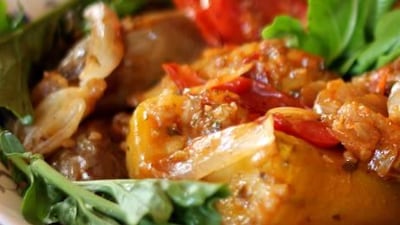Little about molokhia, a viscous green soup originating in the pharaonic times, lends itself to what the 10th century Fatimid Caliph, Al Hakim bi 'Amt Allah, believed. The caliph, who also ruled against the manufacturing of women's shoes to keep them in the home, banned the dish because he thought it led women to debauchery.
Seemingly, the ban had little lasting effect on the popularity of molokhia, made from finely chopped jute leaves, garlic and coriander - it remains a national staple. Yet today, for those unable to grab a chair at an Egyptian dinner table, molokhia - like many of the country's best dishes - is likely to go untasted.
"When Egyptians want a good traditional meal, they don't go to restaurants, they go home where their mothers cook up a delicious spread," said Eric Monkaba, the co-founder of Qasr Twenty.
Launched in April, Qasr Twenty, an upmarket cooking school in the heart of downtown Cairo, targets tourists with hands-on short courses in traditional and regional Egyptian cuisine.
Located in a remodelled Art Deco villa, the school offers four cooking stations to accommodate up to eight students at once. The four-hour course teaches participants to prepare a five-course meal, including well-known dishes such as molokhia and mahshy - courgettes and aubergines stuffed with fragrant rice - or duqqa, a hand-ground blend of wild grains and herbs from the Sinai Peninsula.
"The idea was to celebrate Egyptian cuisine, but also give participants an opportunity to taste home cuisine and learn something on the way," Monkaba added.
The course is an engaging mix of insight into the daily life of Egyptian housewives, the history of the country's best-known dishes as well as a lot of chopping, coring and tasting. Though the school has used celebrity television chefs on occasion, Monkaba prefers the intimacy provided by his regular instructors, both homemakers.
"We want someone teaching who is really in the kitchen every day cooking for their family, it's more comfortable," he said. In addition to teaching cooking courses, Randa Abd Al Wahab is a trained Egyptologist and tour guide. With a flair that comes from years of entertaining busloads of middle-aged Europeans, Abd Al Wahab opened a recent course by sharing her own early experiences in the kitchen under her mother-in-law's tutelage.
"In the Middle East we have a saying 'To win a man's heart is to feed him'," she said.
"As a newlywed, I had never cooked, so I put cardamom, which I love, in every dish. Eventually, my husband hid the jar in his office in protest. I kept learning, got better, and somehow managed to get my hands on some more cardamom."
Bowls of roasted aubergine, tahini, lemon, garlic, spices and fresh coriander are laid out on the table as Abd Al Wahab explains how the amount of tahini, an essential ingredient in Egyptian mezze, affects the taste and texture of babaganoush. To add a chargrilled, smoky taste to oven baked aubergine, Abd Al Wahab recommends wrapping a charcoal chip in tinfoil, pouring a little olive oil on the top and adding it to the baking try.
In the class, she explains how to properly mash a mixture of onion, garlic and pepper mixture into a paste in a mortar. "I remember watching my grandmother pound meat in a heavy, copper mortar to make kibbeh, and using the same mortar for babaganoush," she said, adding that the 5kg mortar was a constant fixture in her grandmother's kitchen.
The class emphasises traditional methods over modern gadgetry. Pestles and mortars replace food processors. To make molokhia, leaves must be plucked from the bunches, washed and then left to dry.
If cooked while wet, the moisture will create a foam at the top of the soup that needs to be skimmed off. Students finely chop the leaves using a makhrata, a curved knife with two handles.
The chopping turns the leaves bright green and slightly moist. The key spicing for the dish comes from a simple preparation of equal amounts of chopped garlic and coriander, which is fried in butter until it is golden brown.
Throughout the course, the kitchen retains a sharp smell of garlic, a favoured ingredient in most of Abd Al Wahab's dishes.
In the desert regions, such as Siwa, an isolated oasis near the Libyan border, the leaves are often dried and stored for when it's out of season.
"They can still make it from the dried leaves, it will give it that same consistency," said Monkaba.
Unlike gourmet tourism, which focuses on high-end restaurants, culinary tourism encompasses food experiences of all kinds, from a meal in a family home to buying crockery. Though culinary tourism has been quick to take off in other parts of the world, it remains a largely unexplored niche in Cairo.
The city is home to two other cooking schools, the TV personality Dina Sarhan's Culinary Solutions attracts upper-middle-class Egyptians who want to learn western recipes, while the House of Cooking offers trainings and catering. But neither has the same focus on traditional cooking methods or specifically targets tourists.
"A lot of tourists ask me 'So what can I do tonight?' and the truth is, there isn't a lot to do in Egypt at night," said Monkaba.
"We're hoping this can fill that need."
With major tourist sites closed in the evenings, visitors are left with few cultural options beyond the sound and light show at the pyramids, a whirling dervish performance or the odd traditional music night. The school hopes to act as a remedy to that, offering both a meal and an activity.
But, dwindling tourist numbers in the wake of this year's revolution have pushed the Qasr Twenty to broaden its services by hosting tastings with celebrity chefs and acting as a rentable private space.
"We keep things as interactive as possible," said Monkaba, "We're careful to keep the focus on cooking."
For more information go to www.qasrtwenty.com

